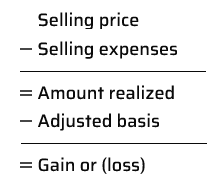Sale of Personal Residence
The sale of your principal residence may be perhaps the largest financial transaction of your lifetime. The Internal Revenue Code (IRC) recognizes the vital importance of home ownership to the overall resilience of the American economy by allowing you to exclude some or all the long-term capital gain (LTCG) realized when you sell your principal residence.
You may take the exclusion only on the sale of a home that is your principal residence, meaning your main home. The exclusion can apply to many different types of housing facilities. A single-family home, multi-family home, condominium, townhome, cooperative apartment, mobile home or a houseboat each may be a main home that therefore qualify for the exclusion. However, a second home, vacation home or residential rental property does not qualify for the exclusion.
To qualify for the maximum LTCG exclusion ($500,000 if married, filing jointly; $250,000 if single), you must meet these Eligibility Tests:
- Automatic Disqualification
The sale of your home isn’t eligible for the exclusion if any of the following are true:
-
- You acquired the property through a §1031 Like-Kind Exchange during the past 5 years.
- You are subject to the expatriate tax
- Ownership
You owned the home for at least 24 months of the last 5 years leading up to the date of sale. For a married couple filing jointly, only one spouse has to meet the Ownership Test. - Residency
You owned the home and used it as your residence for at least 24 months of the previous 5 years. The 24 months of residency can fall anywhere within the 5-year period, and it does not have to be a consecutive block of time. For a married couple filing jointly, each spouse must meet the residency requirement individually in order for them to claim the full exclusion of $500,000. - Look-Back
You did not sell another home during the 2-year period before the date of sale of your current home. You may take the exclusion only once during any 2-year period. - Exceptions to the Eligibility Test
There are several exceptions to the Eligibility Test, such as separation or divorce, the death of a spouse, the sale of vacant land, ownership of a remainder interest, etc. Please refer to IRS Publication 923, “Selling Your Home” for additional details.
Tax Tip
If you are a widowed taxpayer who doesn't meet the 2-year ownership and residence requirements on your own, consider the following rule. If you haven’t remarried at the time of the sale, then you may include any time when your late spouse owned and lived in the home, even if without you, to meet the ownership and residence requirements.
Tax Tip
If you are a widowed taxpayer, you may be able to increase your maximum exclusion of capital gain from $250,000 to $500,000 if you meet all the following conditions:
- You complete the sale of your home within 2 years of the death of your spouse.
- You haven’t remarried at the time of the sale.
- Neither you nor your late spouse took the exclusion on the sale of another home less than 2 years before the date of your current home’s sale.
- You meet the 2-year ownership and residence requirements (including your late spouse’s time of ownership and residence, if applicable).
Figuring Your Gain or (Loss)
To figure the gain or (loss) realized on the sale of your principal residence, you must know the selling price, the amount realized, and the adjusted cost basis. Subtract the adjusted cost basis from the amount realized to determine your gain or (loss).
A positive number indicates a gain; a negative number indicates a (loss).
Let’s look at an example (see link below). Suppose you sell your principal residence in 2024 for $1,000,000. You purchased it back in 2004 for $250,000. Here is how to calculate your gain or (loss):
Here is how to calculate the Adjusted Cost Basis in your home (see link below):
Note 1
“Costs to get property ready for sale” are any last-minute painting, repairs, etc., expenses that you incurred to get your home prepared for sale.
Note 2
“Depreciation expense” is the sum of any depreciation expense that you had claimed either as a Home Office expense on Form 8829 and/or as residential rental property expense on Schedule E, if any, during all years prior to and including the year of sale.
Note 3
“Improvements” are all large expenditures that you incurred to improve the home. These include, but are not limited to, additions, bathrooms, a kitchen, energy systems, hot tub or pool, new roof, new driveway, significant landscaping, outbuildings, etc.
Note 4
If you’ve owned your home for a considerable length of time, it may be difficult for you to find various receipts, especially the original Closing Disclosure that governed your purchase of your home, and/or the receipts from the various improvement projects that you undertook. Don’t fret; do the best that you can from memory to recall as many such expenditures as possible.
More Topics
"Joe provides clear and thorough responses to questions, and ensures that all reports are submitted on time."
David Pollack - Lexington, MA
"He provides his clients with a thorough review of their situation whether it is for a personal or a business account in a professional manner."
NS, Sunapee, NH
"Joe has been our CPA for several years. He has an incredible eye for detail and never misses any information when putting our tax returns together."
Stu & Betty Schlackman, Richardson, TX
Have a Question? Contact Us Today!
Sunapee: 603.763.0350
24 Pine Grove Rd., Sunapee, NH 03782
Lexington: 781.274.6600
405 Waltham St., Suite 382, Lexington, MA 02421

